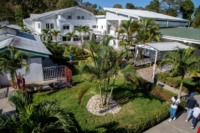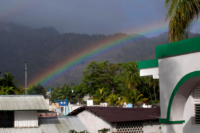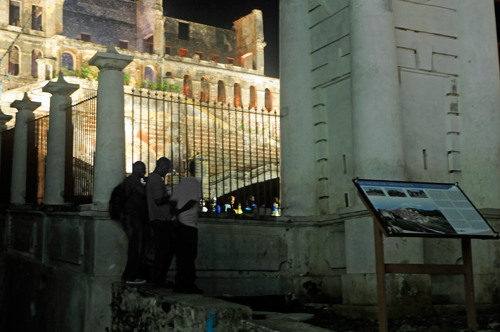 By Tim Traynor
By Tim Traynor
Director of HSC Facilities
It’s early Sunday morning and it is also Carnival.
Last night San Souci palace near the old cathedral at the southern end of Milot was lit by two large myopic flood lights similar to those you might see at a grand opening for a new Sears store and a large, roaring generator that occupied the better part of a flatbed truck. They were set off as beacons to welcome that slender class of wealth, the elite of Haiti; government officials and those few fortunate who could afford the $100 per couple entrance fee to a lavish party intended to kick off the week of celebrations leading to Ash Wednesday’s beginning of Lent.
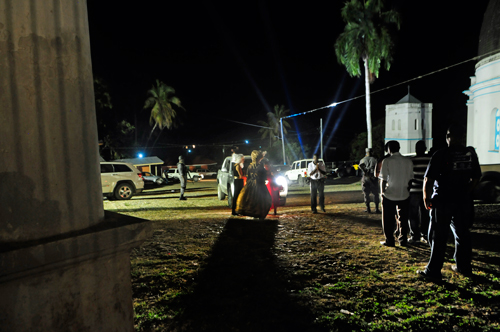
This year, the town was selected from all of the other communities in Haiti to key note the celebrations. And as such, a bevy of police in polished boots and gold braided cords draped over their shoulders pacing to and fro while awaiting such dignitaries as President Martelly who would open the festival with a signature ball.
Not far from the corona of the arc lights and just within the edge of shadows, there stood another group of black helmeted men wearing para-military garb accented by thick, bullet-proof vests.
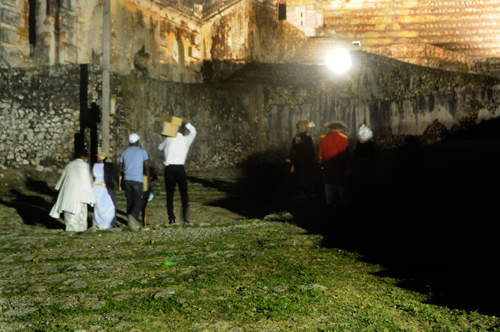 They shuffled about just inside the sphere of darkness fidgeting with their high powered rifles, truncheons and riot gear peering towards the chain link fence that enclosed the palace grounds. And once past these fellows, there lurked the unending blackness of the dank Haitian night.
They shuffled about just inside the sphere of darkness fidgeting with their high powered rifles, truncheons and riot gear peering towards the chain link fence that enclosed the palace grounds. And once past these fellows, there lurked the unending blackness of the dank Haitian night.
Cars ornamented with pulsating red/blue lights arrived through canyons of locals lining the roadways illuminating their curious faces while fussing sirens proclaimed the importance of each gaggle of guests as they pulled up to the barrier. A constant flow of these privileged few shuttled from their comfortable residences in Cap Haitien and Labadie to an evening of untethered revelry, with chocolate men dressed in powdered perruques and brass buttoned, Royal blue long coats while winged masked women with bleached Mme. de Pompadour wigs and flouncy polonaises, emerged from black SUV’s. I never saw the President arrive. I was told by someone in the crowd that he entered through a back entrance, not surprising in this land of intrigue and upheaval. But the other players in their period costumes were entertainment enough as the frilly men fled for cover with a light rain misting above them and the women struggling to wheedle their large, unwieldy fabrics out of the skinny doors opening out from a modern vehicle.
As I was not one of the chosen to attend, I spent the next few hours taking photos of the flood lit palace and through the iron bars that stood sentinel around the grounds while a light rain fell on the watchers and privileged alike. The contrasts of economics were stunning, if not symptomatic of the environment in which these two disparate groups toil. To me, the class diametric was deafening to the normally tuneful rhythm of daily life sung by the meek citizens of this disparate land. But most interestingly, there was a noticeable absence of contempt by the local population for this type of overt consumption by the upper class.
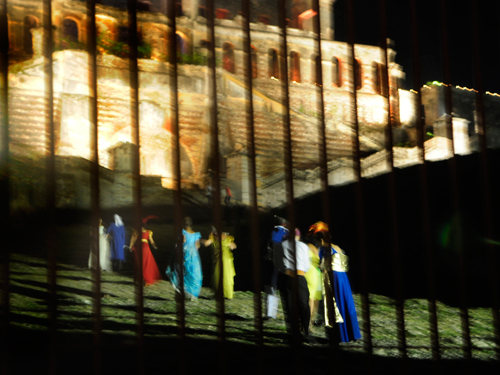 The inhabitants of this gentle community saw the pomp and then went about their own celebration as though the barriers between the classes were to be expected. They knew that their own fête was within reach of their expectations and worthy of their joy. Despite the obvious disparity, they were content to bounce within the shadows lit only by orange flames from thin wax candles to a rhythmic resonance that mimicked the music that floated down to their ears from high within the palace.
The inhabitants of this gentle community saw the pomp and then went about their own celebration as though the barriers between the classes were to be expected. They knew that their own fête was within reach of their expectations and worthy of their joy. Despite the obvious disparity, they were content to bounce within the shadows lit only by orange flames from thin wax candles to a rhythmic resonance that mimicked the music that floated down to their ears from high within the palace.
And now it is Sunday morning, and the locals are headed back to the palace but for another type of celebration that of the Eucharist.
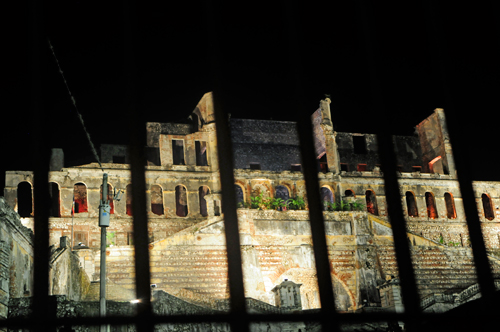
The cathedral which witnessed the comings and goings the night before takes center stage and the celebration of the Mass will abide.
I am reminded that in the eyes of God, we are all equal; no separations or distinctions made by our position of power or size of our purse. He sees us all as His children.
I am also reminded that I should not judge others whether in the light of absurd contrasts of wealth and privilege or in the deepest anguish of privation. The hope lies not in drawing out the differences, it is in finding the common good in us all to place our hands together to build a better Haiti.
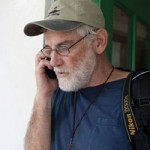
Tim Traynor serves as Director of HSC Facilities. He splits his time between Milot and his home in Kiawah Island, South Carolina.


